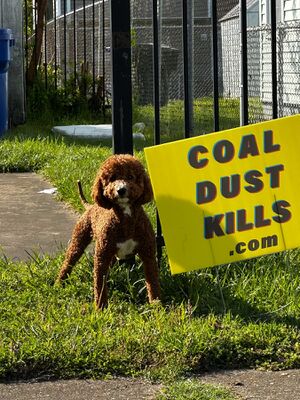Repair Lab
The Repair Lab is a group of activists, social and physical scientists, and artists focused on environmental justice based at the University of Virginia. The Repair Lab formed in 2020 and is co-founded and co-directed by Kim Fields and Sally Pusede. Adrian Wood is the Repair Lab Multimedia Producer and Tara Miller the former Policy Research Specialist. Funding for the work of the Repair Lab has come from the University of Virginia Karsh Institute for Democracy, Robert Wood Johnson Foundation, University of Virginia Department of Environmental Sciences Goodell Fund, and the Anthropocene Institute.
Practitioner-in-Residence (PIR) Program
The Repair Lab PIR program's primary objective is to position grassroots environmental justice activists at the center of the environmental policy debates affecting their communities.[1] The Repair Lab PIR program provides financial, logistical, research, and media resources to individuals and teams for one-year environmental justice residencies. PIRs direct and work as part of the Repair Lab team to develop a policy intervention, policy implementation plan, and related multimedia products such as a podcast and opinion articles. The team expands as required to include additional community members and/or other subject matter experts, who are all financially compensated for their time and contributions. PIRs are identified through an open application process requiring a short proposal describing the issue that will be the focus of the residency.
The Repair Lab PIR program was designed to support community preferences for action through policy as opposed to the generation of more research. The Repair Lab approach builds on established frameworks for community engagement, in particular, the International Association for Public Participation,[2] but with a focus on collaborating with activists from historically marginalized groups specifically. The Repair Lab PIR program was developed as a response to current trends in environmental justice research that privilege technical and scientific expertise, have top-down organizational structures, and lack genuine engagement with the most-affected people.[3] [4] We define community engagement broadly as activities that build relationships, trust, and capacity to support equitable problem solving and collective action.
In addition to producing new community-centered environmental policies, the Repair Lab PIR program cultivates community thought leaders and contributes to the political learning, socialization, and activation of PIRs. PIRs build networks with other activists and organizers and become recognized as leaders by local politicians and other decision-makers. These relationships and the expertise developed and held by PIRs remain in the community after the residency has ended, facilitating continuity and deepening affected constituents’ expressions of their preferences and priorities, as is essential for both compelling and evaluating government responsiveness.
Coal Dust Kills

Developed by Repair Lab Practitioners in Residence, Lathaniel Kirts and Malcolm Jones, Coal Dust Kills is a campaign focused on driving policy change and community-supported solutions to coal dust mitigation in Southeast Newport News and Lambert's Point. As part of Coal Dust Kills, the Repair Lab and partners, especially Yugonda Sample-Jones of EmPower All, have been involved in a range of activities to advocate for new local and state policies around coal dust mitigation.
The Repair Lab team has interviewed current and former Hampton Roads residents affected by coal dust pollution, installed a PM2.5 and PM10 community air monitoring network in Southeast Newport News and Lambert's Point, released the report, "Coal Dust in Southeast Newport News Is a Nuisance and There Are Solutions," held community meetings, launched Voices in the Dust, and is currently focused on collecting dust sample to characterize its trace metals composition and produce evidence that coal dust is present inside residents' homes.
Repair Lab Multimedia Producer Adrian Wood produced and released Crosswinds, a five-episode podcast connecting listeners to the coal dust problem through fact-based reporting, emotive scenes, and interviews with residents, weaving together audio documentary, journalism, and sound art methods. The podcast begins by rooting listeners in the lifelong friendship of the PIRs. Crosswinds explores the mixed blessings of recent development in both Southeast Newport News and Lambert's Point and how gentrification has the potential to influence the coal dust issue. Listeners are transported along the train tracks built by convict laborers, connecting the mountains of West Virginia to the coal export terminals in Curtis Bay and Hampton Roads, following the coal dust into the air, homes, and lungs of residents. Crosswinds surveys the science of airborne coal dust and the burden of proof placed on communities to demonstrate harm for protection through the regulatory and political process. Finally, Crosswinds features a sermon by Kirts, a pastor in Southeast Newport News, asking what it takes to keep going in the long struggle for justice.
Wading Between Two Titans
Developed by Repair Lab Practitioner Kim Sudderth, the Wading Between Two Titans project focused on sea-level rise and climate gentrification in historically and predominantly Black neighborhoods in Norfolk.
[text]
Documents
- Fields et al., Practicing Repair: Advancing community-based solutions on coal dust pollution in Hampton Roads, Virginia through a practitioner-in-residence program, Environmental Justice, 2024
- International Association for Public Participation, IAP2 Spectrum of Public Participation, 2018
References
- ↑ Fields et al., Practicing Repair: Advancing community-based solutions on coal dust pollution in Hampton Roads, Virginia through a practitioner-in-residence program, Environmental Justice, 2024.
- ↑ International Association for Public Participation, IAP2 Spectrum of Public Participation, 2018.
- ↑ Wilson et al., A Critical Review of an Authentic and Transformative Environmental Justice and Health Community—University Partnership, International Journal of Environmental Research and Public Health, 11 (12) 12817–12834, 2014.
- ↑ Ottinger, Buckets of Resistance: Standards and the Effectiveness of Citizen Science, Science, Technology, & Human Values, 35 (2), 244–270, 2010.